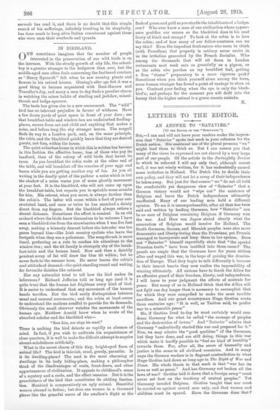IN BIRDLAND.
ONE sometimes imagines that the number of people interested in the preservation of our wild birds is on the increase. With the steady growth of city life, the school- boy is a greater stranger to the hedgerow than ever, but the middle-aged man often feels concerning the feathered creature as "Henry Ryecroft " felt when he saw country plants and flowers in his retired leisure. Gissing's alter ego felt it was a good thing to become acquainted with Rest-Harrow and Traveller's Joy, and many a man to-day finds a peculiar charm in watching the minor habits of starling and jackdaw, missel- thrush and hedge-sparrow.
The taste has given rise to a new amusement. The "wild" bird has no inherent prejudice in favour of wildness. Have a few dozen yards of quiet space in front of your door; see that breakfast-table and window-box are undisturbed feeding- places, secure from cat and child and anything that makes a noise, and before long the shy stranger learns. The seagull finds its way to a London park, and, on the same principle, the robin and the blackbird quickly learn that they are desired guests, not foes, within the house..
The quiet suburban house in which this is written has become in this fashion the effective home, less of those who pay its landlord, than of the colony of wild birds that haunt its trees. As you breakfast the robin waits at the other end of the table, and will breakfast off the remains of your eggs and bacon while you are getting another cup of tea. As you sit writing in the deadly quiet of the parlour a noise which is but the shadow of a noise warns you of some ghostly movement at your feet. It is the blackbird, who will not come up upon the breakfast-table, but expects you to sprinkle some crumbs for him. Hie retreat, when you move, is always further than the robin's. The letter will come within a foot of your out- stretched hand, and once or twice he has snatched a dainty direct from my fingers. But the blackbird always retires a decent distance. Sometimes the effect is comical. In an old orchard where the birds knew themselves to be welcome I have seen a blackbird rise from the strawberries when I was five feet away, making a leisurely descent before the intruder was ten paces beyond him—like Irish country cyclists who leave the footpath when they see a policeman. The song-thrush is more timid, preferring as a rule to confine his attentions to the window-box; and the tit family is strangely shy of the break- fast-table and the human hand. Now and then a daintily pendent scrap of fat will draw the blue tit within; but he never feels to the manner born. He never learns the robin's cool attitude of demand—the quiet standing round and waiting for favourite dainties like oatmeal.
Has any naturalist tried to tell how the bird makes its inferences ? Richard Jefferies told us long ago (and it is quite true) that the human hat frightens every kind of bird. It is easier to understand that any movement of the human bands terrifies. But the bird easily distinguishes between usual and unusual movements ; and the robin at least seems to understand the motions needful to provide for its demands. Obviously the small observer watches the movements of the human eye. Matthew Arnold knew when be wrote of the absorbed scholar and the blackbird who—
"Sees him, nor slops his meal."
There is nothing the bird detects so rapidly as absence of mind. In fact, if you wish to cultivate his acquaintance at close quarters, it is well to make the difficult attempt to acquire absent-mindedness artificially.
What is the secret charm of this tiny, bright-eyed form of animal life P The bird is thievish, cruel, greedy, parasitic. Is it its dwelling-place ? The nest is the most charming of dwellings in its leafy hiding-place, making a philosopher think of the disadvantages of rents, front-doors, and other appurtenances of civilization. It appeals to childhood's sense of a mystery and a cache, and the effect remains. But it is the gracefulness of the bird that constitutes its abiding fascina- tion. Mankind is comparatively an ugly animal. Beautiful women abound in fiction; but does one woman in a thousand please like the graceful curve of the swallow's flight or the flash of green and gold as you startle the inhabitants of a hedge- row? Who ever knew a man of our civilization whose appear- ance gratifies our senses as the blackbird does in his neat livery of black and orange ? To look at the robin is to love the robin; and of how many of our fellow-creatures can we say this P Even the impudent fruit-eaters who seem to think (with Proudhon) that property is robbery never excite in us the irritation generated by the French Socialist. Who. among the thousands that will sit down in London restaurants next week eats as gracefully as a pigeon, or as the robin who perches on my breakfast loaf, getting a firm "stance" preparatory to a more vigorous peck ? Sometimes when you think yourself alone among the trees, some human stranger has found a point of vantage to stare at you. Contrast your feeling when the eye is only the black- bird's; and perhaps for the moment you will drift into the heresy that the higher animal is a grave cosmic mistake.


































 Previous page
Previous page